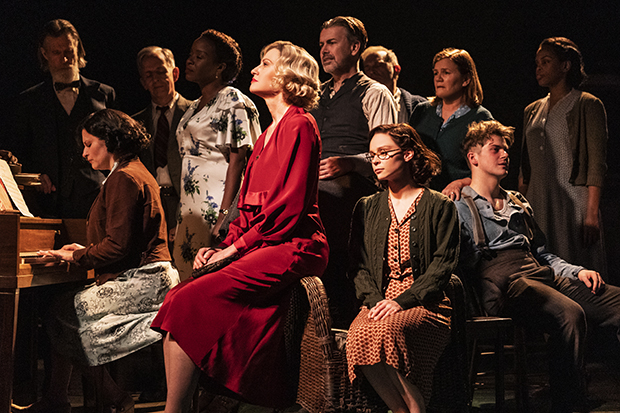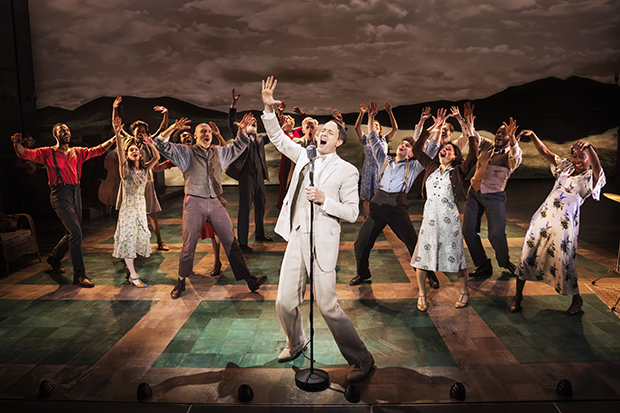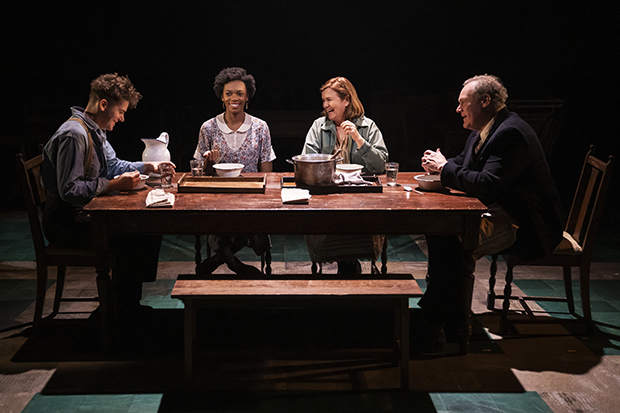Girl From the North Country Wraps the Music of Bob Dylan Around a Gloomy New Play

(© Matthew Murphy)
Jukebox musicals exhaust me. Even though I enjoy individual shows, the whole genre of musicals built around the song catalogues of famous recording artists feels worn-out. They mostly come in two types: the revisionist history bio-musical (Ain't Too Proud, Tina) or the contrived reverie (Head Over Heels, Escape to Margaritaville). Both methods are dispiriting in their own ways, so it is exciting that writer-director Conor McPherson is attempting to break the mold with Girl From the North Country, which uses the music of Bob Dylan to decorate a depressing new drama. The songs have little direct relation to the events onstage, and they never move the action forward — but should that matter?
My review of the 2018 off-Broadway production was generally positive, and there is still a lot to recommend Girl From the North Country now that it is playing Broadway's Belasco Theatre (a suitably haunted venue). The mood McPherson and his cast are able to sustain over two and a half hours is impressive. And who doesn't want to hear the words of America's only living Nobel laureate in literature incanted on a Broadway stage? Unfortunately, I cannot seem to get the taste of spinach out of my mouth when I think about Girl From the North Country: I know it's good for me, but I still don't feel much enthusiasm for it.
Some of that surely derives from McPherson's ultra-bleak story: It's 1934 and Nick (Jay O. Sanders) runs a Duluth, Minnesota, guesthouse with his wife, Elizabeth (Mare Winningham) and their adopted daughter, Marianne (Kimber Elayne Sprawl). The bank is ready to foreclose, and Nick is trying to find a safe landing for his family: He wants Marianne to marry elderly shoe-mender Mr. Perry (Tom Nelis), and he wants his alcoholic son, Gene (Colton Ryan), to take a job with the railroad. Elizabeth is struggling with early onset dementia, but Nick is hoping for a parachute of cash to open when the inheritance is settled for the late husband of Mrs. Neilsen (Jeannette Bayardelle), a widow staying in the guesthouse. She and Nick talk about buying a hotel with the money, almost like they are husband and wife.
A whole village of unfortunate souls inhabit the Laine guesthouse: There's handsome prize fighter Joe Scott (Austin Scott), who has recently been released from prison following a wrongful conviction. He arrives with oily bible salesman Rev. Marlowe (Matt McGrath). Down-on-his-luck businessman Mr. Burke (Marc Kudisch) is a long-term resident with his wife (Luba Mason), and their mentally challenged son, Elias (Todd Almond). There are so many overlapping plots that McPherson falls back on a somewhat hoary convention to fill in the exposition.
"My name is George Arthur Walker," our narrator (an NPR-folksy Robert Joy) introduces himself. "I'm a doctor. Least I was. Back when this was our world." And in that early line, we instantly know that we're watching a bunch of ghosts, doomed to reenact their grim fates.
It's easy to become mesmerized by the beautiful apparition of McPherson's production: Rae Smith's ghostly boardinghouse set and muted period costumes transport us back to the '30s. Under Mark Henderson's shadowy and deceptive lighting, it looks like it could disappear at any moment. Conversely, ghostly silhouettes appear upstage to sing backup and shake tambourines during the musical numbers. Ingeniously arranged and orchestrated by Simon Hale, those Dylan songs are the real reason to see Girl From the North Country.

(© Matthew Murphy)
The show is full of unforgettable performances: Winningham delivers an achingly sincere rendition of "Like a Rolling Stone." Almond leads the cast in an exuberant performance of "Duquesne Whistle" that feels like a nice resolution for Elias if you manage to ignore the lyrics: "You say I'm a gambler, you say I'm a pimp," he wails as we wonder, Who called him that? The same issue arises in Scott's rousing interpretation of "Hurricane." Who is Patty Valentine? And why did she call the cops on a "hot New Jersey night" when Scott clearly states that his alleged crime occurred outside of the Twin Cities?
In his song selection, McPherson is obviously interested in emotional impact over literalism. I suppose this approach is preferable to a cheesy scene depicting a masked thief and a harlequin joker conspiring under a watchtower, but it's hard to ignore the fact that the lyrics only bear the most tenuous relationship to the play — so why use them at all? I wonder how McPherson's script would hold up without the use of Dylan songs as tentpoles. Certainly, I wouldn't mind seeing a theatricalized Dylan concert onstage, à la David Byrne's American Utopia. This synthesis of the two feels like an unsatisfying compromise: an attempt to put a song catalogue onstage while calling it serious drama. On the latter front, McPherson is only partly successful.

(© Matthew Murphy)
Despite all of the gaps in dramaturgical clarity (I heard several confused patrons trying to piece the plot together during intermission), Girl From the North Country has something important to say to the Broadway audience in 2020. It is the story of a bunch of people in an impossible situation, holding out for a hero who doesn't exist, or a windfall that won't materialize — and that is also the story of many of our fellow Americans today. This isn't the first generation to feel desperation, and it probably won't be the last. As a species, we seem fairly incapable of learning from the mistakes of our ancestors. At least in McPherson's version of a spectral visitation, the ghosts make time to sing us beautiful songs.










